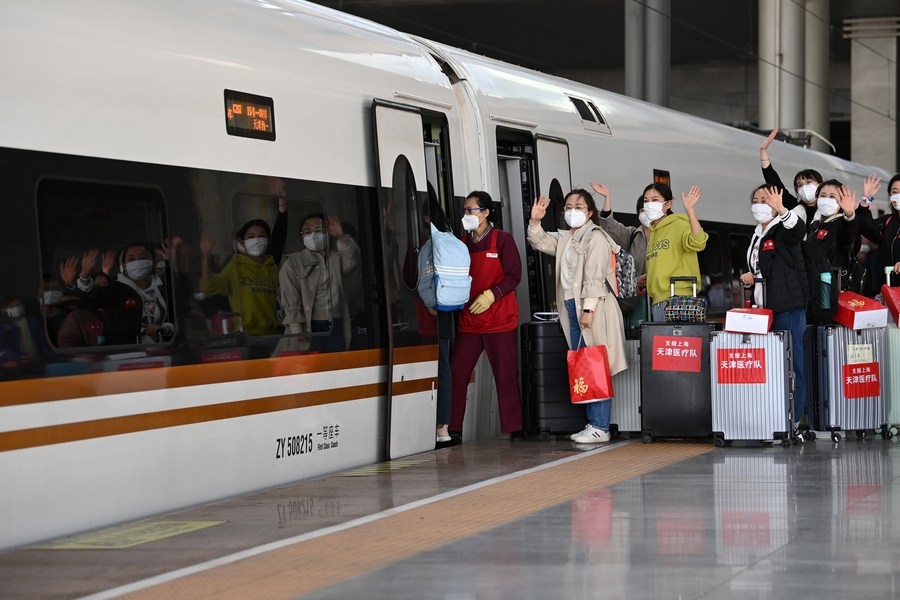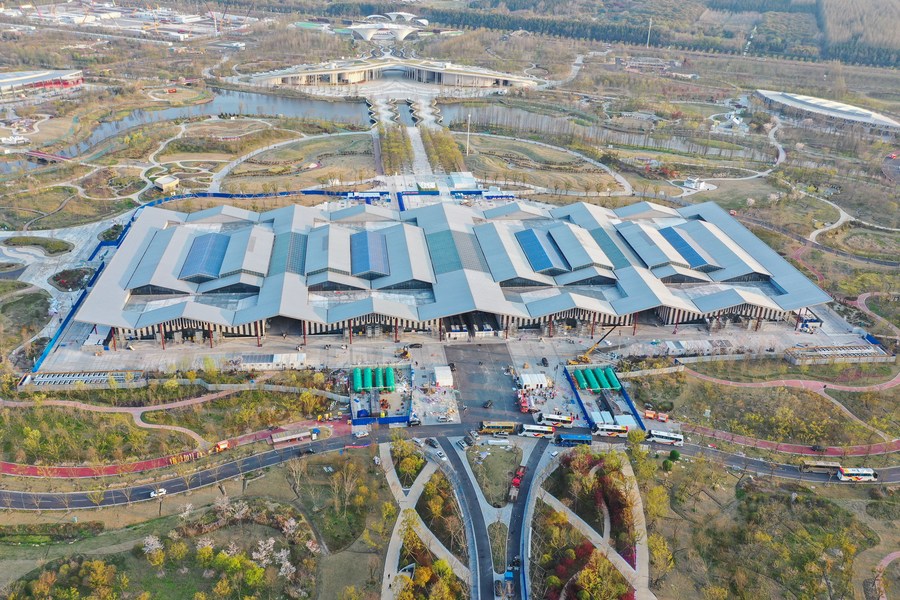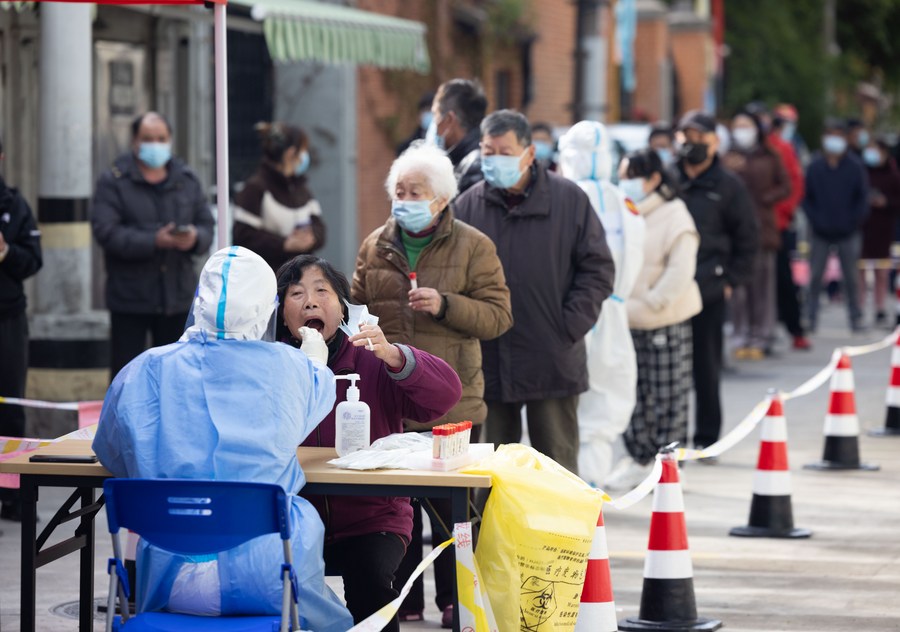

* More than 38,000 medics from 15 provincial-level regions have rushed to China's business hub Shanghai to aid the megacity in its fight against resurging COVID-19.
* Since March 1, about 90,000 people in Shanghai have been infected with the highly contagious Omicron variant.
* Shanghai has decided on Wednesday to launch a new round of mass testing as a fresh effort to cut off the transmission in communities and contain the latest COVID-19 resurgence.

Photo taken on April 3, 2022 shows medics departing Tianjin West Railway Station in north China's Tianjin for east China's Shanghai to help the megacity fight COVID-19 amid the recent resurgence. (Xinhua/Li Ran)
SHANGHAI, April 6 (Xinhua) -- More than 38,000 medics from 15 provincial-level regions have rushed to China's business hub Shanghai to aid the megacity in its fight against resurging COVID-19.
Some 27,000 medics are responsible for sampling and testing work, and another 11,000 work in temporary hospitals, according to the National Health Commission.
Shanghai reported 311 confirmed locally transmitted COVID-19 cases and 16,766 local asymptomatic carriers on Tuesday.
Since March 1, about 90,000 people have been infected with the highly contagious Omicron variant, data from the municipal health commission shows.
CONCERTED EFFORT
The Shanghai Hongqiao Railway Station resumed its bustling scene over the past few days, with dozens of trains carrying thousands of medics and tonnes of anti-epidemic supplies pulling in. Between April 3 and 4, a total of 26 charter flights from seven provincial-level regions landed in Shanghai's two major airports.
"We were notified on April 2, immediately formed a team of 60 medics and arrived in Shanghai the next day," said Qi Qin with the Tai'an City Central Hospital, east China's Shandong Province.
"Two years ago, when Wuhan and our hospital were in the toughest moment, medics from Shanghai were among the first that arrived," said Cheng Fang, head nurse of the intensive care unit in the south area of Jinyintan Hospital, Wuhan City of Hubei Province.
"Experts from Shanghai taught us step by step how to strengthen personal protection and treat critically ill patients. Now Shanghai has encountered some difficulties. We are duty-bound and should arrive as soon as possible," Cheng said.
Many of the medical teams coming to support Shanghai have rich anti-epidemic experiences.
"Among the 28 medical staff from our hospital, some aided the anti-epidemic fight in Wuhan and some had been to Qingdao. They are the most experienced and elite forces," said Teng Tao, associate chief physician of the endocrinology department of the Second Affiliated Hospital of Shandong University of Traditional Chinese Medicine.
"I was in Hubei for 58 days in 2020. Back then we knew little about the novel coronavirus, as we learn more about it and constantly improve our anti-epidemic measures, I'm sure we can beat it," said Gao Hongyi, a nurse from Shandong.

Aerial photo taken on April 3, 2022 shows a makeshift hospital for COVID-19 mild cases and asymptomatic carriers at the China Flower Expo park in Chongming District of east China's Shanghai. (Xinhua/Ding Ting)
RESOLUTE, SWIFT MOVES
Chinese Vice Premier Sun Chunlan on Saturday urged resolute and swift moves to stem the spread of COVID-19 in Shanghai as quickly as possible.
"It is an arduous task and huge challenge to combat the Omicron variant while maintaining the normal operation of core functions in a megacity with a population of 25 million," Sun said.
She urged that nucleic acid testing capacity and the organization of mass testing be improved as soon as possible to get a clear picture of the epidemic situation.
The megacity is under temporary closed-off management. After the completion of a mass antigen testing on Sunday and citywide nucleic acid testing on Monday, Shanghai has decided on Wednesday to launch a new round of mass testing as a fresh effort to cut off the transmission in communities and contain the latest COVID-19 resurgence.
Over 60 venues, including the over 150,000-square meter Shanghai World Expo Exhibition and Convention Center, have been converted into makeshift hospitals.
The National Exhibition and Convention Center covering a total construction area of 1.47 million square meters, is also being turned into a quarantine site. Upon completion, the center with a planned capacity of 40,000 beds is expected to act as the biggest such hospital for those testing positive for COVID-19.
In the early hours of Monday, the China Flower Expo park in Chongming District opened as a makeshift hospital with over 2,700 beds and received the first batch of mild cases and asymptomatic carriers. The medical teams are from hospitals in Shanghai and Anhui Province.
After registration, the medics will confirm one by one the physical condition of the cases -- whether they have underlying diseases, developed symptoms or have been vaccinated, and make further arrangements and nursing plans.
Zhu Minghua, from the First Affiliated Hospital of Anhui Medical University, meticulously arranged the treatment of patients. "We must pay close attention to the possible emotions of all the people here," noted Zhu.

A medical worker takes a swab sample from a woman for nucleic acid test in Changning District of east China's Shanghai, April 1, 2022. (Xinhua/Jin Liwang)
MUTUAL SUPPORT
The arrival of medics from outside Shanghai not only enhances the city's treatment ability but also greatly improves the detection capacity.
With the joining of 104 medics from central China's Hunan Province on Sunday, the testing capacity of a lab under Shanghai Biotecan Pharmaceuticals Co., Ltd. has been significantly boosted.
"As our cooperation goes smoother, we hope our daily testing capacity can soon exceed 100,000 tubes," said Wu Shouxin, head of the lab.
Zhang Yuetao and her colleagues headed for Shanghai from the neighboring Zhejiang Province at about 2 a.m. Monday. They were responsible for taking nucleic acid samples for 31,120 residents in Songjiang District before noon.
The seemingly impossible task was completed an hour ahead of schedule.
"Shanghai residents are very cooperative, even the children behave so well," said Zhang. "Zhejiang and Shanghai are members of one family and we should work together to win the war without smoke."
Residents in Shanghai flooded social media platforms to express their gratitude. Many burst into tears after seeing medics from across the country come to help. "Thank you so much for coming all the way to help us," said an elderly after having the nucleic acid sample taken at home by medical staff from Wuhan.
点击右上角![]() 微信好友
微信好友
 朋友圈
朋友圈

请使用浏览器分享功能进行分享
